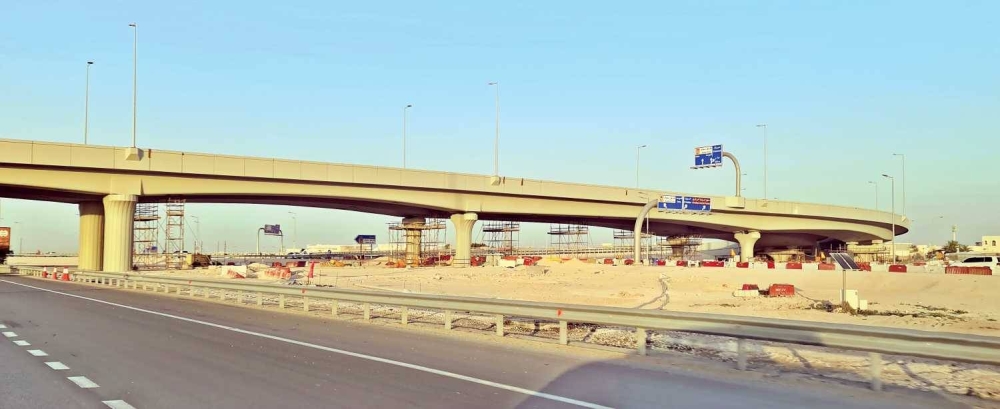The Public Works Authority (Ashghal) has completed 90% of the main works on the Mebaireek Bridge project while partially opening the lane linking the Mebaireek area and Abu Samra Road to the east. The works are carried out as part of Ashghal’s Highways Programme.
The project enhances traffic on Salwa Road for those heading to the industrial Area and the surrounding areas including Ain Khaled, Al-Murra, Fereej Al-Ghanim Al-Jadeed, Muaither, Al-Sailiya, Mebaireek and Abu Nakhla. The project is expected to be completed within the next few months.
According to a report in local Arabic daily Arrayah, the project includes distinctive construction methods such as the use of prefabricated steel beams to reduce closure of the underpass at Al Furousiya and Salwa Interchange. The Mebaireek Bridge is to be implemented in phases to avoid traffic closure for Salwa Road users.
Ashghal is building a new two-level interchange between Al Sailiya Interchange and Mesaieed Interchange, connecting Salwa Road and Mebaireek Street. The interchange includes two main bridges, each 330m long, with several exit points, loops and accesses to local roads connected to the new interchange, facilitating traffic movement in all directions.
Works on the new intersection include construction of bypass roads and local roads with a total length of about 3km, in addition to the construction of 3km of pedestrian paths and 3km of bicycle paths, whereas the area of tree plantation on both sides of the intersection is about 41,000sqm.
The Mebaireek Interchange will contribute to improving traffic flow in the area, shortening journey time by 50% and accommodating more than 8,500 vehicles per hour.
Construction of the Mebaireek Interchange aims to provide a direct free link for commuters through Salwa Road towards the Mebaireek and Al Sailiya areas through service roads in both directions of Salwa Road, for road users heading between Doha, Mebaireek and Al Sailiya areas, and for those heading from Mebaireek and Al Sailiya towards the external areas in the south and west of Qatar such as Abu Nakhlah, Mekainis and Al Karana.
The upgrade project of converting Khalid bin Ahmad Roundabout into a signalled intersection includes the development and expansion of Khalid Bin Ahmed Interchange, to connect Salwa Road, Al Furousiya Street and East Industrial Street. It will enhance traffic flow by accommodating 8,500 vehicles per hour instead of the current 5000, and cutting mobility time to about 80%. The signal-controlled intersection will consist of six lanes with many entry-exit points, 2.8km-long connection roads, and tree plantation over approximately 10,000sqm.
The new signal-controlled intersection will regulate traffic and provide more traffic safety instead of place of the existing roundabout, with necessary expansion, which will facilitate the connection of traffic between Salwa Road, Al Furousiya Street and East Industrial Street, and serve residential neighbourhoods in the area.
This will reduce travel time to various destinations by approximately 80%, while construction of the Mebaireek Bridge and several local roads connected to the new Mebaireek intersection will reduce the journey time to about 50%. The construction of two intersections on Salwa Road will enhance traffic flow between Doha, Al Rayyan Municipality and external areas, as it provides an alternate option to Al Sailiya Interchange.
Ashghal relies more on local materials and local manufacturers to supply materials such as lighting poles, traffic signs, sewage pipes, rainwater drainage pipes, asphalt and precast hard materials including manholes, concrete and steel.
Construction of the Industrial and Mebaireek intersections will contribute significantly to enhance the movement of passengers and goods, as they constitute a link between the Abu Samra border point in the southwest and Hamad Port.

A view of the project.
